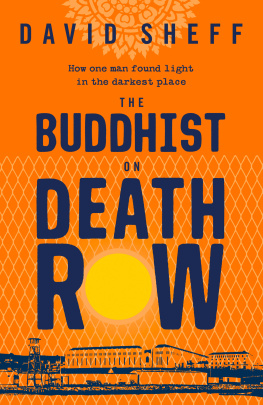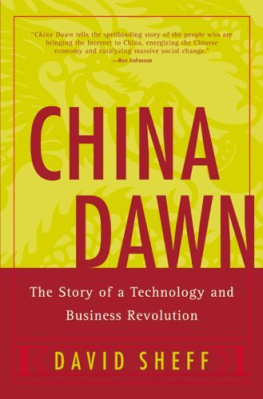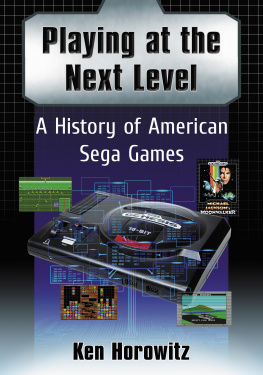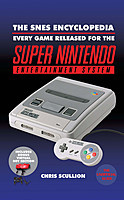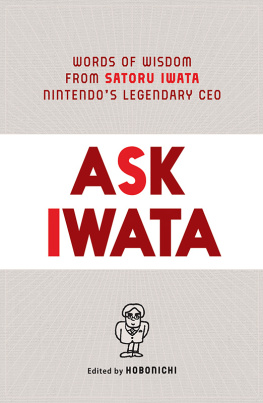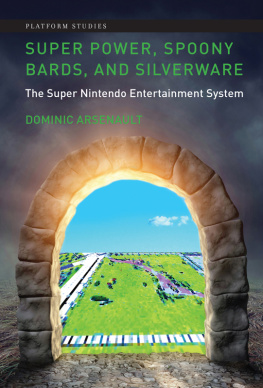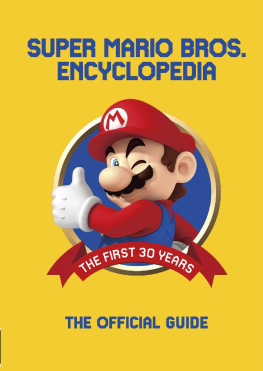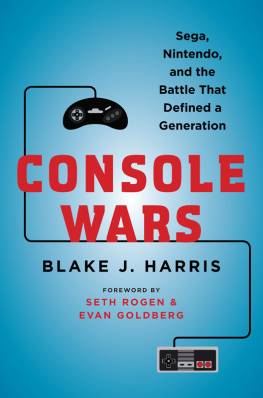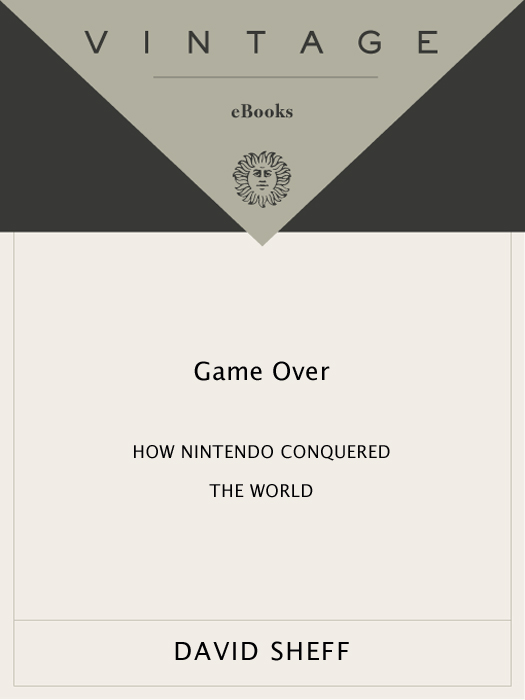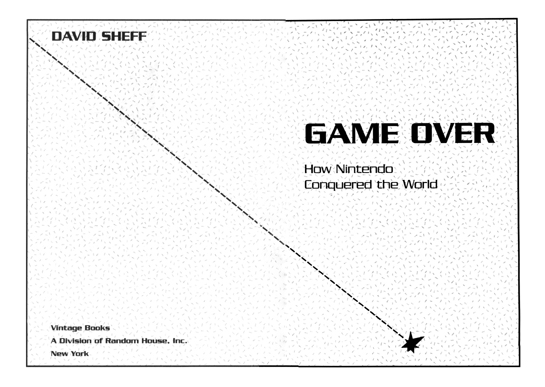Acclaim forDAVID SHEFFs
GAME OVER
An intriguing portrait of what it takes to succeed in todays competitive computer industry.
Washington Post Book World
A fascinating story of the birth and growth of video games Sheff has done a fine job explaining the high-tech computer world story of complicated games that children can playand the people who are bringing this new world to us, whether we want it or not.
Kansas City Star
A fascinating look at the Japanese way of doing business At times, Game Over reaches the pitch of a Cold War spy novel.
L.A. Daily News
Writing with the playful pluck of Mario, the little protagonist of the Super Mario Bros. games, Sheff unfolds an engrossing tale of how Kyoto-based Nintendo, once a small playing-card company, transformed the U.S. toy and computer businesses.
People
Vivid portraits of the principal players and shrewd insights into Japanese and American corporate culture make this an unusually enjoyable business history.
Entertainment Weekly
My advice is simple. Read Sheffs book.
Wichita Eagle
David Sheff lays bare the corporate machine beneath the high-technology fun of Japans most profitable company. Sheff painstakingly documents the history of Nintendo and its relentless rise to dominance of the global toy industry.
Macleans
Game Over is a fascinating look at the Nintendo phenomenon, filled with insiders insights and plausible predictions about the future. Sheffs book is an absorbing read, even for non-Nintendo junkies.
Birmingham News
ALSO BY DAVID SHEFF
The Playboy Interviews with John Lennon and Yoko Ono
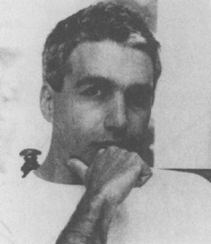
DAVID SHEFF
GAME OVER
David Sheffs articles have appeared in Playboy, Rolling Stone, The Observer, and Foreign Literature (in Russia), among other publications, and on National Public Radios All Things Considered. His book The Playboy Interviews with John Lennon and Yoko Ono was a Literary Guild Selection. Sheff lives in Northern California with his wife, Karen Barbour, and son, Nicolas.

FIRST VINTAGE BOOKS EDITION, APRIL 1994
Copyright 1993, 1994 by David Sheff
All rights reserved under International and Pan-American Copyright Conventions. Published in the United States by Vintage Books, a division of Random House, Inc., New York, and simultaneously in Canada by Random House of Canada Limited, Toronto. Originally published in hardcover in slightly different form by Random House, Inc., New York, in 1993.
Portions of this work were originally published in Focus, Mens Life, and Rolling Stone.
Grateful acknowledgment is made to the San Francisco Examiners Image magazine for permission to reprint an excerpt from Condemned to Be Mario by Scott Rosenberg. Reprinted by permission of the San Francisco Examiners Image magazine.
Library of Congress Cataloging-in-Publication Data
Sheff, David.
Game over: how Nintendo conquered the world / David Sheff.1st Vintage Books ed.
p. cm.
Originally published: 1st ed. New York: Random House, c1993. With new afterword.
Includes bibliographical references.
eISBN: 978-0-307-80074-9
1. Nintend Kabushiki Kaisha. 2. Electronic games industry.
3. Nintendo video games. I. Title.
HD9993.E454N577 1994
338.76179480952dc20 93-42581
Author photograph Steve Barbour
v3.1
This book is dedicated to Karen Barbour, who insists that Donatello, Rafael, Leonardo, and Michelangelo are painters, not Teenage Mutant Ninja Turtles, and to my son, Nicolas, who introduced me to Nintendo, but now prefers reading.
ACKNOWLEDGMENTS
Brief portions of this book appeared in Rolling Stone, Playboy, Mens Life, and San Francisco Focus. Thanks to sources named and unnamed, the hundreds of interview subjects. Thanks particularly to the following: At NCL, Hiroshi Yamauchi, Hiroshi Imanishi, Sigeru Miyamoto, Masayuki Uemura, Genyo Takeda, Gunpei Yokoi, Reiko Wakimoto, and Yasuhiro Minagawa. At NOA, Minoru Arakawa, Howard Lincoln, Peter Main, Al Stone, Phil Rogers, Gail Tilden, Don James, John Sakaley, Toshiko Watson, Sandy Hatcher, Sherrie Mennie, Tony Harman, Blaine Phelps, and numerous others, particularly Bill White. Yoko Arakawa was especially gracious and forthcoming. At Sega, Al Nilsen. At Atari Games, Hide Nakajima, Dennis Wood, Dan Van Elderen, and Barry Kane. At Electronic Arts, Trip Hawkins, Bing Gordon, Larry Probst, Danny Brooks, and particularly Holly Hartz, who sets the standard for public relations in this industry.
At other Nintendo licensees, Henk Rogers, Sheila Boughten, Greg Fischbach, Bruce Lowry, Gilman Louie, Les Crane, Bob Lloyd, Allyne Mills, Joe Morici, Kathleen Watson, Kathy Prall, and the many others. At Hill & Knowlton, Jeff Fox, Karen Peck, Don Varyu, and especially Lynn Gray, for support above and beyond the line of duty when she initially championed this book. At Golin/Harris, Alison Holt and Susan Iannetta, and at Manning, Selvage and Lee, Charlene Gigliotti.
Analysts, including David Leibowitz (American Securities), Manny Gerard and Sean McGowan (Gerard Klauer Mattison & Co.), Robert F. Kleiber (Piper, Jaffray & Hopwood), and Andrew J. Kessler (Morgan Stanley), periodically contributed their expertise.
Id also like to thank Robert M. Callagy, Vladimir Pokhilko, Vadim Gerasimov, Howard Phillips, Nolan Bushnell, Robert Stein, Ron Judy, Suzuki Eiichi, Miyuki Grace, Jim Mackonochie, Steve Arnold, Elliot Luber, Deborah Brown, Phil Adam, David Ellis, Ben Myron, Mark Smotrof, Les Inanchy (Sony), Greg Zachary of The Wall Street Journal, Casey Corr, Tim Healy and Tom Farrey of the Seattle Times, Rich Karlgaard at Forbes ASAP, Jaron Lanier (J.P.L.), Sharon Fitzpatrick (The Learning Co.), Lynn Hale and Sue Sesserman (Lucasfilm and LucasArts), Marty Taucher (Microsoft), Linda Goetz, and Jenifer Van Horn. In Japan: Keisuke Ono, Yukio Miyazaki, Tsunekazu Ishihara, Yoshio Ito, Koh Shimizu (Sony), and Nishi Saimaru.
Special appreciation goes to Alexey Pajitnov, the creator of Tetris. Also to many sources who spoke under the condition of anonymity. At Random House, I would like to acknowledge the contributions of Deborah Aiges, Carol Schneider, Lesley Oelsner, Mitchell Ivers, Gail Blackhall, Lawrence LaRose, Becky Simpson, Brian Hudgins, and designer Oksana Kushnir, Amy Edelman for pushing deadlines, and Veronica Windholz, Ed Cohen, and Sybil Pincus for tireless copyediting.
Special thanks to my editor for his insights and his devotion to books, to Binky Urban, my agent, for her counsel and commitment, and to Barry Golson for assigning the original Nintendo article from which this book grew. My thanks as well to Arthur Kretchmer and Steve Randall, my editors at Playboy magazine; to Mike Moritz and Fred Bernstein for their insights and advice. Thanks also to Amy Rennert, who assigned the article on Nolan Bushnell for


